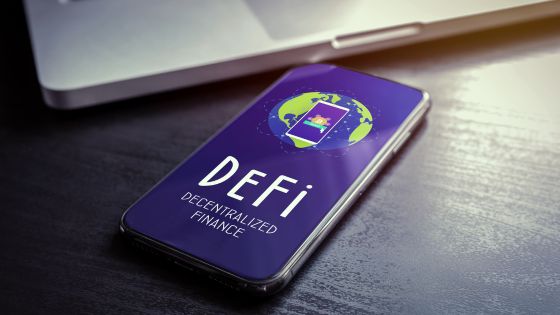Decentralized finance, also known as DeFi, has emerged as a powerful disruptor in today’s world. As a system that operates without intermediaries, it enables peer-to-peer transactions. This concept can potentially revolutionize traditional finance by providing increased accessibility, transparency, and autonomy. As we look to the future, here are some top predictions and trends to watch out for in the DeFi space.


1. Increased adoption of crypto as a payment method
With no signs of slowing down, cryptocurrencies may eventually become more widely accepted as a form of payment. In particular, we may see more employers paying employees in crypto. This could provide several benefits for both parties. For example, it could reduce the cost and time associated with traditional payroll processes.
Additionally, it could allow employees to have more control over their finances. They could have the option to be paid in crypto or have their wages converted to fiat currency. Workers could also choose to hold on to their cryptocurrencies if they see their value increasing over time.
However, note that there are several risks associated with compensating employees in crypto. For one, the volatility of cryptocurrencies may lead to fluctuations in the value of employees’ salaries. Also, there may be legal and regulatory hurdles to overcome, particularly in countries where digital assets are not yet widely accepted. Thus, it’s crucial for companies to carefully consider diverse scenarios before adopting cryptocurrency as a method of remuneration.
2. More robust security protocols
Another trend to watch out for in the DeFi space is the increasing importance of security risk assessments. As the scale and complexity of distributed financial ecosystems continue to grow and higher amounts of capital are involved, the likelihood of security breaches and hacks also increases.
Given this reality, DeFi protocols must conduct comprehensive threat analyses and implement formidable security measures. These measures may include multi-factor authentication systems, cold storage of funds in offline hardware wallets, and periodic vulnerability audits. Additionally, it will be essential to adopt a proactive approach when it comes to the identification and resolution of security issues. As the security threats in the DeFi space continue to evolve, staying vigilant and proactive could be the key to mitigating risks and preventing losses for DeFi users and platforms alike.
3. Offshore banking as a viable option
Offshore banks have long been popular among corporations and entrepreneurs, enabling many to take advantage of favorable tax laws and regulations. In addition, overseas financial services can provide privacy, which is particularly valuable for high-net-worth individuals or businesses. However, “offshore” can often mean “off limits” to ordinary folks whose asset value could not justify the prohibitive fees. However, with DeFi, more people can access offshore banking with lower minimum deposit requirements and fewer bureaucratic hurdles.
Among the countries well-positioned to become leaders in the blockchain-based financial landscape is Gibraltar. Home to several financial institutions, Gibraltar is a trusted financial hub with a solid regulatory framework for DLT or Distributed Ledger Technology. This provides clarity and certainty for DeFi platforms, making the British Overseas Territory an attractive destination for crypto startups and investors.
4. More accessibility to mainstream investors
One prediction for the future of DeFi is that it will become more accessible to mainstream investors. Currently, most platforms require users to have some technical expertise and familiarity with crypto. This has limited the adoption of DeFi to a relatively small group of early adopters. However, as DeFi platforms become more user-friendly and accessible, a more comprehensive range of investors may enter the space, encouraged by increased stability and more rigorous regulations.
5. Enhanced interoperability
As the number of DeFi platforms and protocols continues to multiply exponentially, the aspect of interoperability is likewise gaining more and more significance. Each platform has its individual strengths and weaknesses, and for DeFi to realize its full potential, these infrastructures need to communicate and work together seamlessly. To achieve this, developers are working on cross-chain protocols that support asset transfers between different blockchain networks. Cross-chain interoperability will make it possible for DeFi applications to access a larger pool of liquidity, expanding the range of use cases for decentralized finance. As the DeFi ecosystem becomes more mature, promoting interoperability will be essential to ensure the continued growth and development of the industry.
6. More decentralized governance models
Finally, we may see a shift towards more decentralized governance models in the DeFi space. Right now, many platforms are controlled by a centralized team of developers and administrators. While this system has its advantages, it can also lead to conflicts of interest and, potentially, the abuse of power.
To address this issue, DeFi protocols may adopt more decentralized governance models that utilize blockchain technology and smart contracts for network-based decision-making. These models empower token holders to vote on key decisions involving protocol upgrades, changes to the protocol’s functionality, and security measures. Decentralized governance mechanisms are inherently more transparent and allow for a fairer distribution of power. Thus, they make an attractive alternative to centralization. Such models will not only promote accountability and equitability but also enhance the security and reliability of DeFi applications. As a result, they can provide a more efficient and trustworthy system for users.
The takeaway
Indeed, the future of DeFi looks bright and promising. As the technology continues to grow and mature, we can foresee the increasing adoption of cryptocurrencies as a form of payment, a focus on security risk assessments, and the increased viability of offshore banking. On top of these, there may also be greater accessibility for mainstream investors, increased interoperability, and a shift towards more decentralized governance models. However, it will be important for all stakeholders in the DeFi space to remain vigilant and proactive in addressing risks and challenges. Indeed, Defi has the potential to transform the financial landscape and provide greater economic freedom and autonomy to more people around the world.
Eager to learn more about the latest news and the most in-depth analyses in the tech, business, education, lifestyle, and entertainment spaces? Then visit the blog of AskAnyQuery today!
















